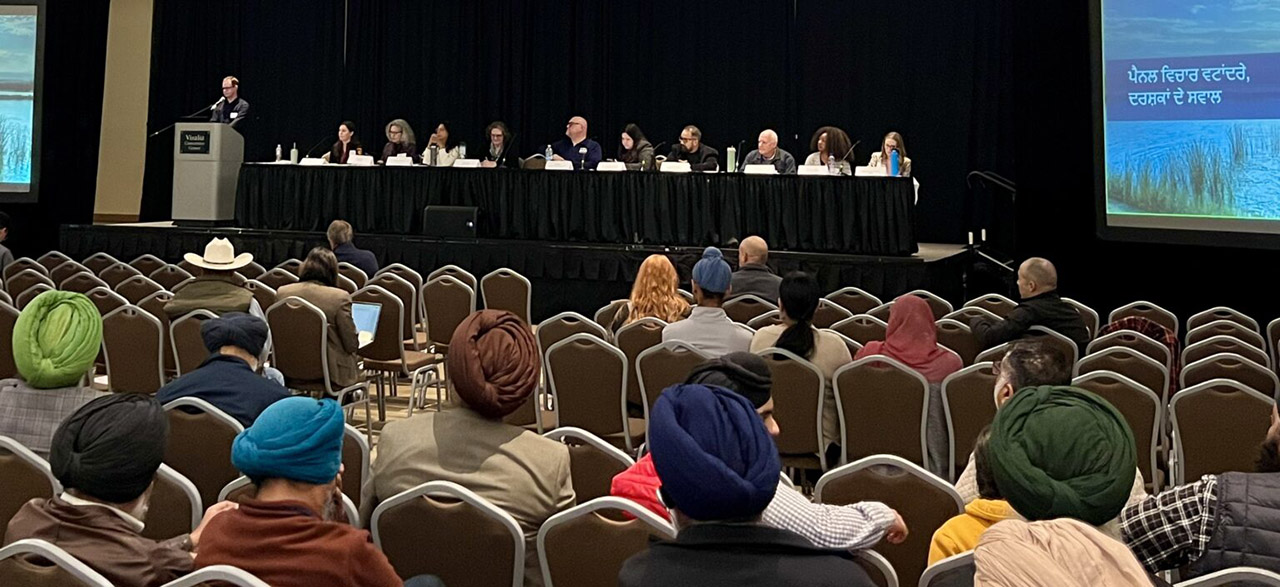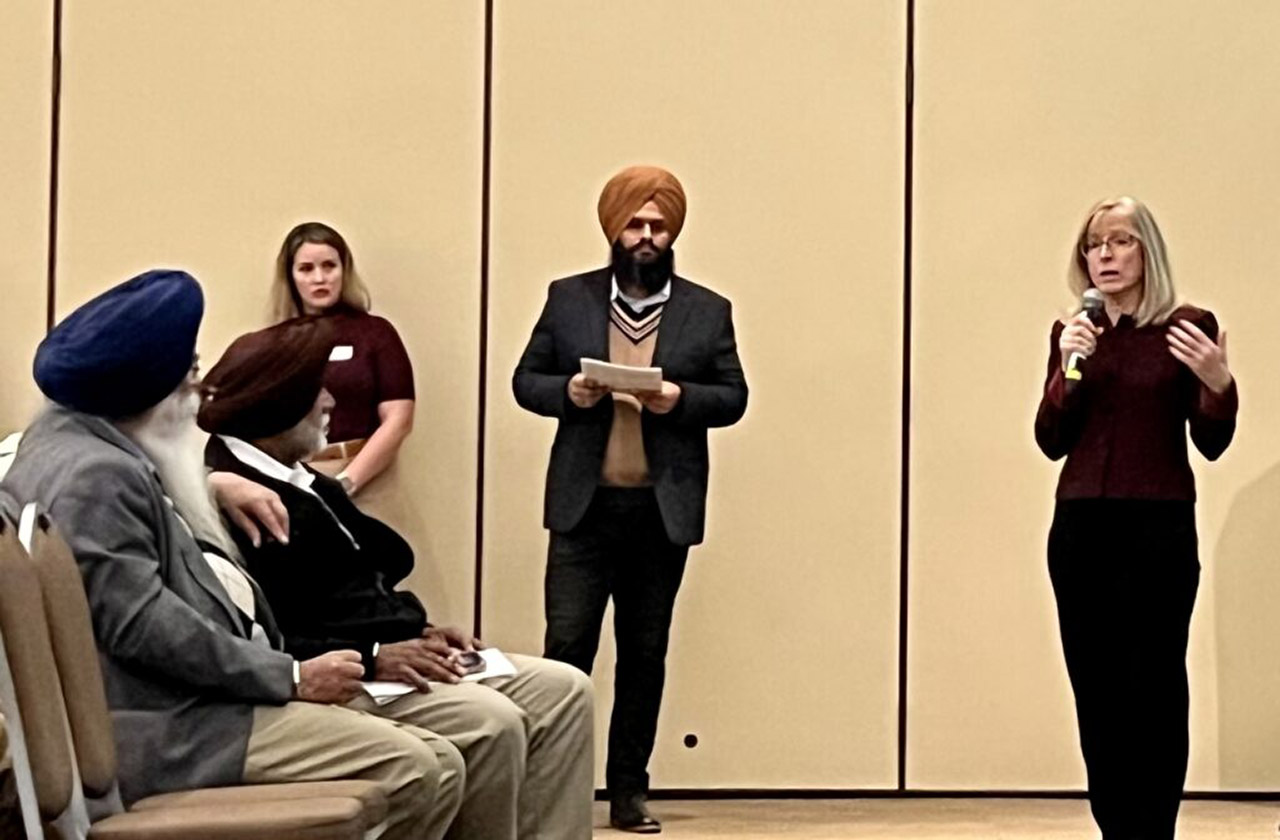Punjabi farmers express frustration over lack of clarity on groundwater regulations at Visalia workshop. (SJV Water/Lisa McEwen)

- Farmers worry SGMA could destroy San Joaquin Valley agriculture and related businesses.
- State officials encourage local involvement, but farmers feel caught between state and local agencies.
- Punjabi American Growers Group seeks unified voice to address concerns, but fears it may be too late.
Share
After a four-hour workshop with state officials in Visalia, Punjabi American farmers were left frustrated and questioning whether California realized it had weaponized groundwater in a way that could destroy the San Joaquin Valley.

Lisa McEwen
SJV Water
“SGMA has good intentions,” said Selma grower Nick Sahota during the Dec. 5 event. “But it has become a weapon to destroy the San Joaquin Valley.”
He wanted to know if lawmakers had considered the impacts not just on farmers, but trucking, convenience stores and other ancillary valley businesses that rely on ag when they passed SGMA in 2014.
Sahota referred to the Sustainable Groundwater Management Act, which aims to bring severely overdrafted aquifers into balance by 2040. To do that, local groundwater sustainability agencies, GSAs, have been working to increase water recharge opportunities and reduce pumping.
900,000 Acres of Farmland Will Be Fallowed: Experts
Even with those measures, though, experts estimate that 900,000 acres of productive land will have to be fallowed throughout the Central Valley. Most of that – 600,000 acres – will be in Kings, Tulare and Kern counties.
As access to groundwater has become tighter and more expensive, growers have become increasingly worried, especially in the valley’s large Punjabi community which has the additional burden of a language barrier that many feel hasn’t been properly accommodated.
The Punjabi American Growers Group was formed in 2020 to try and address some of those concerns, said Vice President Jasbir Sidhu.
Calls to PAGG from growers are heart rending, he said.
“They are asking, ‘Should my kids go into ag? Should we close down our operations? Whose guidance should we follow?
“All we’re asking is which land will be fallowed? Identify it now. If someone’s farm is going to go, they need to know that.”
Growers need answers to determine how to run their businesses, and those continue to be in short supply, Sidhu said.
Related Story: How Three Trump Policy Decrees Could Affect California Farmers
“There’s a huge disconnect between the folks who made the law and those who are enforcing the law,” he said.
Growers Rely on Groundwater
At least half the growers at the Dec. 5 workshop have farms in areas that are totally reliant on groundwater, making their operations highly vulnerable to pumping restrictions.
PAGG orchestrated the workshop, which hosted representatives from nearly a dozen state agencies as well as Dorene D’Adamo, vice chair of the state Water Resources Control Board, SGMA’s enforcement arm.

D’ Adamo said the role of the state Water Resources Control Board is limited, as state leadership believes water is best managed at the local level. She encouraged the crowd of about 75 farmers to get involved with their local groundwater sustainability agencies.
“It took years to get into this situation and it’s going to take a while to turn the corner,” she said. “With additional resources we are hopeful you can get to sustainability.”
That message was received with some skepticism.
Related Story: What Is Saving Grace for Embattled Valley Farmers? People Always Need Food
“Passing the buck isn’t the answer,” Sidhu said. “The local GSAs turn around and say they’re doing what they’ve been told to do by the state, but the state is saying control is at the local level. What do you do?”

Farmers at the workshop expressed gratitude that the state had come to Visalia for the event, but most still had a lot of questions and confusion over SGMA.
“The reality is, a lot of farmers don’t go into those (GSA) offices because they’re afraid, and a lot of paperwork is thrown at them,” Sidhu said.
PAGG President Arshdeep Singh noted that many of the state agencies came to the workshop armed with brochures outlining programs that may offer farmers technical assistance or even grant funding.
But it’s too little, too late.
“I consider myself a proactive grower, and my GSA never reached out to me,” Singh told the workshop panel. “It takes just one year to turn a groundwater dependent grower upside down, and SGMA is driving us out of business. That’s why you have all these grants. You should have had all this ready in 2014.”
‘Banks Don’t Wait’
Water, he said, is just one factor on a farmer’s roster.
Fertilizer, fuel, labor – everything is going up, shrinking farmers’ profit margins, Sidhu said.
“And banks don’t wait. Some people are walking away.”
Still, Sidhu said the workshop was an important first step, and has helped lay the groundwork for future meetings with state and federal agencies.
He invited other farmers to join PAGG, as it exists for all growers, not just Punjabis.
“With a unified voice, we could actually get something done. We are only 10 years late.”
About the Author
SJV Water Reporter Lisa McEwen grew up in Tulare County. She has reported on agriculture and other issues for a wide variety of publications, including, Ag Alert, Visalia Times-Delta, the Fresno Bee and the Tulare and Kings counties farm bureau publications.
About SJV Water
SJV Water is an independent, nonprofit news site covering water in the San Joaquin Valley, www.sjvwater.org. Email us at sjvwater@sjvwater.org.
RELATED TOPICS:
Categories

How to Help Spay/Neuter 1,000 Cats Ahead of Kitten Season

Teen Arrested at Visalia Mall After Firearm Report
















